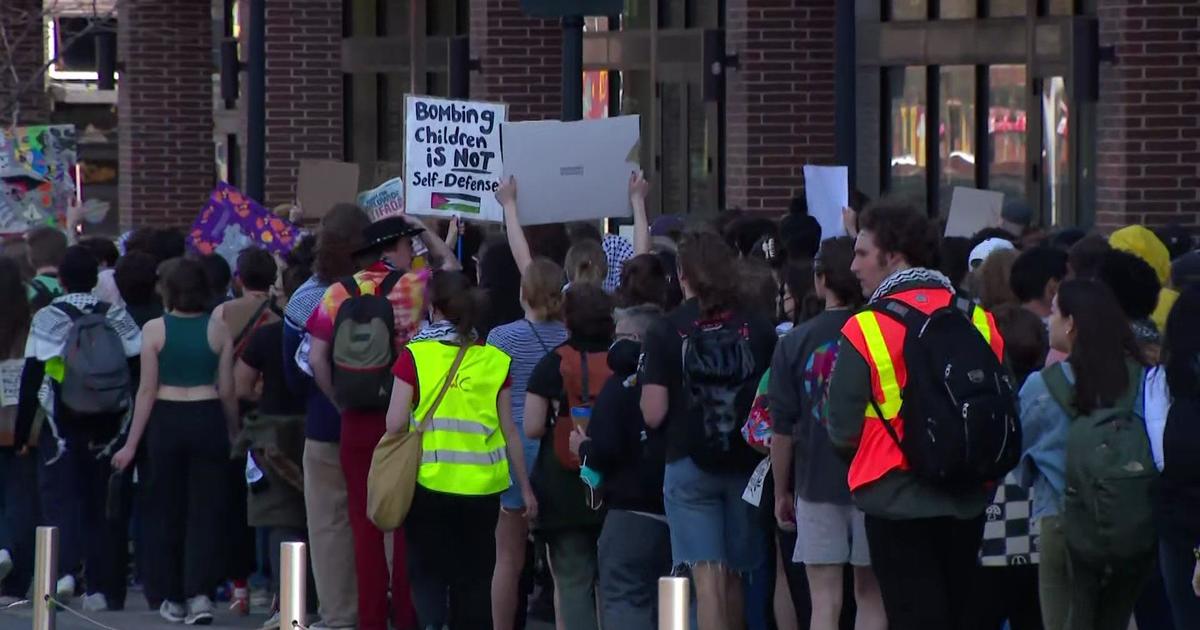Coronavirus In Wisconsin: Protesters Gathered Outside Capitol Calling To Reopen The State
MADISON, Wis. (AP) — Wisconsin's chamber of commerce on Friday urged the governor to allow businesses to reopen starting May 4, three weeks sooner than is called for under his stay-at-home order, while protesters converged at the Capitol in defiance of public health orders designed to curb the spread of the coronavirus.
Wisconsin Manufacturers and Commerce released its plan hours before the rally, the largest in the state to date and similar to others that have popped up across the country. Democratic Gov. Tony Evers' current order closing most nonessential businesses runs until May 26, but Republicans are asking the state Supreme Court to block it and force the Department of Health Services to propose a new rule.
Police estimated the crowd at around 1,500 people. No one was arrested. Many protesters carried signs urging a reopening of the state's businesses and blaming Evers for putting people out of work. Some carried signs calling for Evers to be recalled from office. A common complaint from his critics during the pandemic has been that he's not listening to businesses and others who want to be more aggressive in loosening closure orders.
The state chamber said its plan is designed to allow for a safe opening of businesses, taking into account those operating in more rural or suburban areas that have been less affected by COVID-19. As of Thursday, there were more than 5,000 confirmed cases statewide and nearly 260 deaths, with more than half of those in Milwaukee. The number of infections is thought to be far higher because many people have not been tested, and studies suggest people can be infected without feeling sick.
The state's health leaders have said cases appeared to be trending downward, but they were closely watching for a yet-to-develop spike tied to in-person voting in the April 7 election. They also urged protesters to keep a safe distance from one another.
Wisconsin Manufacturers and Commerce said its plan was developed with input from a diverse group of business, government and medical interests. They said it also calls on best practices and recommendations from the Occupational Safety and Health Administration and the Centers for Disease Control.
The plan creates an algorithm that takes into account the local infection rate, health care utilization, population density and other factors to determine what limitations would be placed on a business. All businesses could open, but their operations would be limited based on local factors calculated under the model.
Republicans have been arguing that the state needs to be more flexible in how it approaches closures, given that the majority of coronavirus cases are centered in the urban areas of Milwaukee, Madison and Green Bay.
Evers rejected the plan Friday, saying in a statement that he would keep working with businesses owners and others as he implements his own reopening plan. Evers has consistently argued that his order keeping most businesses closed until May 26 is driven by science and the best way to curb the spread of the virus. Evers has also said he's open to making revisions as conditions change.
As of Friday, 5,236 people in Wisconsin had been infected and 262 have died. The number of infections is thought to be far higher because many people have not been tested, and studies suggest people can be infected with the virus without feeling sick.
Brown County continued to grapple with a cluster of outbreaks linked to three meatpacking plants. County health officials said 189 cases have been linked to employees from JBS Packerland in Green Bay and their family members; 75 cases have been linked to employees from American Foods Group in Green Bay and their family members; and 23 cases have been linked to employees from Salm Partners in Denmark and their families. Denmark is a village of 2,700 about 20 miles southeast of Green Bay.
For most people, the new coronavirus causes mild or moderate symptoms, such as fever and cough that clear up in two to three weeks. For some, especially older adults and people with existing health problems, it can cause more severe illness, including pneumonia, and death.
(© Copyright 2020 The Associated Press. All Rights Reserved. This material may not be published, broadcast, rewritten or redistributed.)



